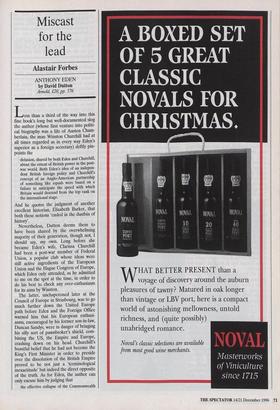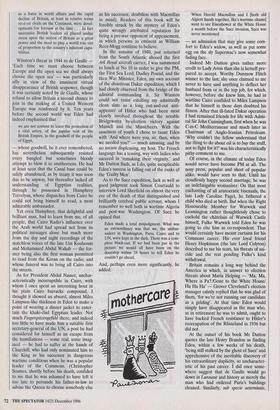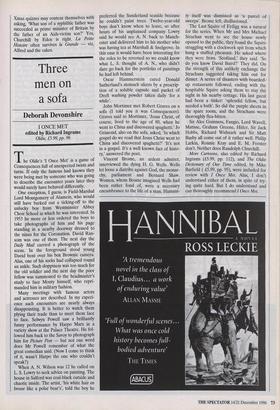Miscast for the lead
Alastair Forbes
ANTHONY EDEN by David Dutton Arnold, 120, pp. 576 Less than a third of the way into this fine book's long but well-documented slog the author (whose first venture into politi- cal biography was a life of Austen Cham- berlain, the man Winston Churchill had at all times regarded as in every way Eden's superior as a foreign secretary) deftly pin- points the
delusion, shared by both Eden and Churchill, about the extent of British power in the post- war world. Both Eden's idea of an indepen- dent British foreign policy and Churchill's concept of an Anglo-American partnership of something like equals were based on a failure to anticipate the speed with which Britain would descend from the top rank on the international stage.
And he quotes the judgment of another excellent historian, Elisabeth Barker, that both these notions 'ended in the dustbin of history'.
Nevertheless, Dutton deems them to have been shared by the overwhelming majority of their generation, though not, I should say, my own. Long before she became Eden's wife, Clarissa Churchill had been a post-war member of Federal Union, a popular club whose ideas were still active ingredients of the European Union and the Hague Congress of Europe, which Eden only attended, as he admitted to me on the spot at the time, in order to do his best to check any over-enthusiasm for its aims by Winston.
The latter, unchaperoned later at the Council of Europe in Strasbourg, was to go much further down the United Europe path before Eden and the Foreign Office warned him that his European enthusi- asms, encouraged by his former son-in-law, Duncan Sandys, were in danger of bringing his silly sort of pawnbroker's shield, com- bining the US, the Empire and Europe, crashing down on his head. Churchill's boastful belief that he had not become the King's First Minister in order to preside over the dissolution of the British Empire proved to be not just a 'terminological inexactitude' but indeed the direct opposite of the truth. As for Eden, the author can only excuse him by judging that
the effective collapse of the Commonwealth
as a force in world affairs and the rapid decline of Britain, at least in relative terms vis-a-vis rivals on the Continent, were devel- opments few foresaw at the time ... In fact successive British leaders all placed undue stress upon the notion of Britain as a great power and the need to play a world role out of proportion to the country's inherent capa- bilities.
Winston's threat in 1944 to de Gaulle — 'Each time we must choose between Europe and the open sea we shall always choose the open sea' — was particularly silly in view of the imminent virtual disappearance of British seapower, though it was certainly noted by de Gaulle, whose refusal to allow Britain a second chance to join in the making of a United Western Europe was reinforced by it. Ten years before the second world war Eden had indeed emphasised that we are not content to leave the protection of a vital artery, of the jugular vein of the British Empire, to the goodwill of the people of Egypt, — whose goodwill, be it ever remembered, has nevertheless subsequently resisted every bungled but sometimes bloody attempt to blow it to smithereens. He had at least seen that the Canal base could be safely abandoned, as by treaty it was soon due to be anyway, but thereafter lacked all understanding of Egyptian realities, through he possessed in Humphrey Trevelyan, whose dispatches from Cairo he could not bring himself to read, a most admirable ambassador.
Yet even Humphrey, that delightful and brilliant man, had to learn from me, of all people, that Cairo Radio's influence over the Arab world had spread not from its political messages alone but much more from the day and night recordings of the matchless voices of the late Um Koulsoum and Mohammed Abdul Wahab — the for- mer being also the first woman permitted to read from the Koran on the radio, and whose funeral was to bring all Cairo into the streets.
As for President Abdul Nasser, unchar- acteristically incorruptible in Cairo, with whom I once spent an interesting hour in his plain Cairo barracks compound, I thought it showed an absurd, almost Miles Lampson-like thickness in Eden to make a point of wearing a dinner jacket to enter- tain the khaki-clad Egyptian leader. Not much Fingetspitzengefahl there, and indeed too little to have made him a suitable first secretary-general of the UN, a post he had considered for himself as an escape from the humiliations — some real, some imag- ined — he had to suffer at the hands of Churchill, who had only nominated him to the King as his successor in dangerous wartime conditions when he was a popular leader of the Commons. (Christopher Soames, shortly before his death, confided to me that he was ashamed to have left it too late to persuade his father-in-law to advise the Queen to choose somebody else as his successor, doubtless with Macmillan in mind). Readers of this book will be forcibly struck by the mystery of Eden's quite wrongly attributed reputation for being a pre-war opponent of appeasement, in which persons as eminent as William Rces-Mogg continue to believe.
In the autumn of 1940, just returned from the South Atlantic aboard the first Ark Royal aircraft carrier, I was summoned to lunch at No 10 in order to give the PM, the First Sea Lord, Dudley Pound, and the then War Minister, Eden, my own account of the disastrous Dakar expedition, which I had closely observed from the bridge of the admiral commanding it. Sir Winston could not resist extolling my admittedly clean slate as a long out-and-out anti- appeaser of Hitler who had been most closely involved throughout the notable Bridgewater by-election victory against Munich and the Municheers. With the sauciness of youth I chose to taunt Eden with 'And where were you, sir, then, when we needed you?' — much amusing, and by no means displeasing, my host. The French language has a teasing, way with ladies who succeed in 'remaking their virginity,' and Mr Dutton finds, as I do, quite inexplicable Eden's success in falling out of the ranks of the 'Guilty Men'.
As to the Suez expedition, luck as well as good judgment took Simon Courtauld to interview Lord Sheffield on almost the very eve of the death of that distinguished and brilliantly cerebral public servant, whom I remember so well both in wartime Algeria and post-war Washington. Of Suez he opined that Eden made a total misjudgment. What was so extraordinary was that we, the ambas- sadors in Washington, Paris, Cairo and to UN, were kept in the dark. There was a com- plete black-out. If we had been put in the picture we would all have been on the doorstep within 24 hours to tell Eden he couldn't go ahead.
And, perhaps even more significantly, he added:
When Harold Macmillan and I [both old Algiers hands together, Ike's wartime chums] went to see Eisenhower at the White House a month before the Suez invasion, Suez was never mentioned
— an admission that may give some com- fort to Eden's widow, as well as put some egg on the sly Supermac's now somewhat fading face.
Indeed Mr Dutton gives rather more credit to Lady Avon than she is herself pre- pared to accept. Worthy Dunmow Flitch winner to the last, she once claimed to me never to have said anything to deflect her husband from or in the top job, for which, however, before she knew him, he had in wartime Cairo confided to Miles Lampson that he himself in those days doubted his fitness. After that ill-fated Dakar operation I had remained friends for life with Admi- ral Sir John Cunningham, first when he was C-in-C Mediterranean and much later as Chairman of Anglo-Iranian Petroleum. 'Why couldn't the fellow understand that the thing to do about oil is to buy the stuff, not to fight for it?' was his characteristically pithy comment to me.
Of course, in the climate of today Eden would never have become PM at all. The nosy press, popular and short of popular alike, would have seen to that. Until his cloudlessly happy second marriage, he was an indefatigable womaniser. On that most enchanting of all aristocratic bisexuals, the late Lady Caroline Paget, he fathered a child who died at birth. But when the Right Honourable Member for Warwick and Leamington rather thoughtlessly chose to cuckold the chatelain of Warwick Castle himself, Fulke Warwick told Eden he was going to cite him as co-respondent. That would certainly have meant curtains for his Commons career. His ever loyal friend Henry Hopkinson (the late Lord Colyton) described to me his tears, his threats of sui- cide and the rest pending Fulke's kind withdrawal.
Britain remains a long way behind the America in which, in answer to election threats about Maria Helping — 'Ma, Ma, Where is Pa? /Gone to the White House/ Ha Ha Ha' — Grover Cleveland's election manager calmly replied that he was glad of them, 'for we're not running our candidate as a gelding'. At that time Eden would simply have disappeared as the man who, as in retirement he was to admit, ought to have backed French resistance to Hitler's reoccupation of the Rhineland in 1936 but did not.
At the outset of his book Mr Dutton quotes the late Henry Brandon as finding Eden, within a few weeks of his death, 'being still stalked by the ghost of Suez' and apprehensive of the inevitable discovery of his extraordinary duplicity, so uncharacter- istic of his past career. I did once some- where suggest that de Gaulle would go down in Larousse and history as merely the man who had ordered Paris's buildings cleaned. Similarly, sub specie aeternitatis, Xmas quizzes may content themselves with asking, 'What son of a syphilitic father was succeeded as prime minister of Britain by the father of an Aids-victim son?' Yes, Churchill by Eden is right. La Petite Histoire often survives la Grande — viz, Alfred and the cakes.




















































































































 Previous page
Previous page